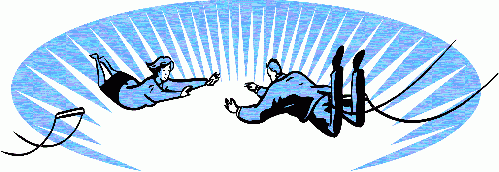How can I trust?
The betrayal of trust is the stuff of national headlines, the grist of theater drama, and the bane of our personal relationships. As I write this, Edward Snowden has been in the news for a year having revealed that the National Security Agency has been doing Orwellian surveillance of domestic communications in the US. Both Snowden and our government leadership have breached our trust.
Our nation is divided politically into adversarial factions that have little trust in the political system or each other: liberal, conservative, libertarian, women, gays, family values, right-to-life, right-to-choose -- it's a very long list, possibly endless.
For more than fifty years distrust of our institutions and government agencies has grown. Following the assinations of John F. Kennedy, Bobby Kennedy, and Martin Luther King there was much speculation about a dark conspiracy. 9-11 spawned more conspiracy theories symptomatic of deep distrust. The revelation that officials deliberately misled congress and the people about the threat posed by Iraq's Saddam Hussain is frequently mentioned as cause for ongoing skepticism about the pronouncements of government officials.
The housing bubble and the 2007-8 financial collapse left us questioning our trust in the US banking system, with high level bankers being characterized as "banksters" -- a special kind of gangster. The GM ignition switch recall brought into question the integrity of one of our major auto producers.
Seemingly there is plenty of evidence that we shouldn't trust anyone. But trust is essential to life in any community, be it our family, our workplace, our town, or our nation. Without it doubt and fear would crowd out love and affection, and caution would bog down all transactions both trivial and large that comprise our relationships with one-another.
Maybe the most obvious example of necessity of trust is money. We trust that the green and black slips of paper denominated as ones, fives, tens, and twenties will be accepted for the food and supplies we need to live. We trust that the promise of payment we make with a credit card or check will be accepted universally. Merchants trust that these promises to pay are authentic and rely upon them almost without question. It's all about trust. In fact our banks now accept a photo of a check for deposit in lieu of the actual instrument.
The point here is that trust is a core issue in all relationships that constitute our society, and it's worthy of some careful examination. We need to understand how trust operates in order to think clearly.
What do we mean by "trust?"
Trust is one of those five letter words that we use without thinking deeply about what it means. So it may surprise you that two wise and learned men regarded the concept of trust to be worthy of extended study and then wrote a business book on the topic. Indeed virtually all the classic philosophers ponder the nature of trust in elucidating their thoughts on human experience.
Building Trust in Business , Politics, Relationships, and Life, by Robert Solomon and Fernando Flores provides important insights for navigating in a very complicated world. As I explain some of the author's basic propositions you'll soon see why I'm including this review essay in the Thinkers Toolkit Series. Don't accept my abbreviated review as sufficient. Buy the book and read it not just for its content but also to observe how the writers, both of them accomplished thinkers, keep peeling the onion of the topic of trust to reveal useful nuance. This is a foundational work for clarity about navigating relationships and interpreting what's happening around you.
The authors start by saying trust is on trial. The world we live in runs on trust. While, there is always room for healthy skepticism, in today's world there is an epidemic of distrust. Distrust leads to suspicion, uncertainty, confrontation, and ultimately alienation. When there is a lack of trust people tend to become fearful, controlling, and resort to threats of force. As Teddy Roosevelt famously said, "Speak softly but carry a big stick." That quote is an icon for the use of power when one distrusts. The Cold War with its doctrine of mutual destruction was the ultimate "big stick."
While distrust is adversarial, trust is cooperative. Distrust is not so much the opposite of trust as it is the flip side of the coin -- both can exist in the same relationship.
We distinguish two distinct kinds of trust. Simple trust is childlike and exists without reflection or intention. But once simple trust is betrayed it can never be recovered. Simple trust is probably what most of us ordinarily mean when we use the word. But as we mature, and the trials and tribulations of life build character, we learn to trust in a different, more conscious way.
Authentic trust is mature and nuanced. "[It] incorporates the possibility of distrust and is inconceivable without it. Such trust is no longer 'simple' but sophisticated and experienced. On the horizon of authentic trust is the penumbra of distrust and together they define the dynamic of relationships," say Solomon and Flores. This kind of trust is created and then reinforced by the ongoing practice of trusting (reliance). Good marriages, good business agreements, and indeed all of the interdependent relationships that make a great society should, ideally, be grounded in authentic trust.
(Note: You can view every article as one long page if you sign up as an Advocate Member, or higher).






